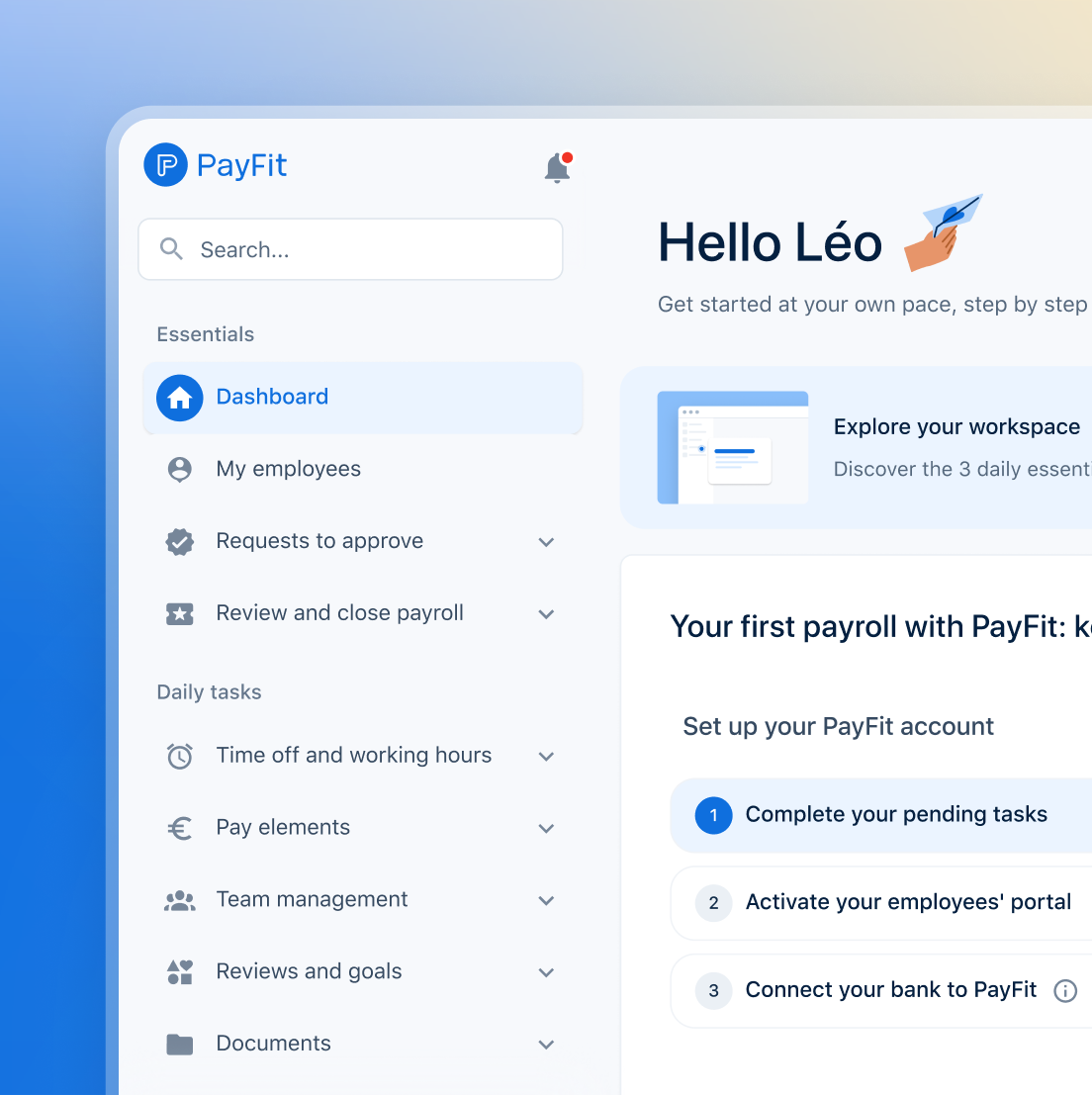✨ Health insurance, now in PayFit - learn more
💷 All the rates & thresholds you need to know for 25/26...right here
✨ The Payroll Journey: Start, Scale & Succeed Globally - learn more
✨ Health insurance, now in PayFit - learn more
💷 All the rates & thresholds you need to know for 25/26...right here
✨ The Payroll Journey: Start, Scale & Succeed Globally - learn more


As an employer, you’re tasked with upholding certain obligations when employing staff - bereavement leave being a part of this in the UK. With everything else you’ve got to remember, it can be tricky to balance all the complexities and nuances that come with giving employees time off when someone dies.
If you’re a business owner or an HR manager looking to top up their bereavement leave knowledge, you’ve come to the right place. This blog explores what bereavement leave is and shares best practices to help you navigate the world of compassionate leave as sensitively as possible.
Bereavement leave is leave your employees might take should a family member or loved one pass away. The employer can grant this leave, such as time off work when a parent dies, to help support the employee through this difficult time, allowing them to make funeral arrangements and manage anything else associated with this period.
Bereavement leave isn’t a legal entitlement in the UK, except for parental bereavement leave.
In other words, there is no statutory leave for bereavement in the UK, apart from when a parent loses a child. In this case, employers must give any parent classed as an employee two weeks of leave if the child is under 18 years of age or if they have a stillborn birth after 24 weeks of pregnancy.
Employees are entitled to take this leave as two consecutive weeks, two separate weeks, or just take one week of leave in total.
Although not legally required to offer any bereavement leave to other employees, many employers will create their own bereavement leave policy to help support their staff members through difficult times. This approach can build loyalty and mutual respect and demonstrate respectful well-being, which is a great strategy for retaining employees.
In most cases, employees have no legal right to bereavement pay (unless it’s parental bereavement pay), but employers should offer a reasonable amount of unpaid time off to attend a funeral or make funeral arrangements, as outlined in the Employment Rights Act 1996.
If the employee is eligible for statutory parental bereavement pay, they can claim £184.03 a week or 90% of their average weekly earnings — whichever is lower.
Biological parents of the child who has died
The child’s parent: adoptive or parent of a child born by a surrogate
Anyone who has day-to-day responsibility for the child
Read more about parental bereavement pay eligibility.
Although bereavement leave might also be referred to as compassionate leave, it isn’t the same thing. Where bereavement leave solely pertains to the death of a loved one, compassionate leave in the UK covers a multitude of distressing situations, such as being a victim of a crime, caring for someone with a serious illness, sudden divorce proceedings, etc.
Again, compassionate leave is not a legal requirement, but many employers do have a compassionate leave policy, entitling employees to reasonable time off.
2026 payroll checklist
There are many benefits to drawing up a comprehensive bereavement or compassionate leave policy, but here are just three.
Presenteeism is where employees come to work even when they’re ill, suffering from poor mental health or something else, and it severely affects how they perform their job. Presenteeism can be caused by a poor workplace environment, i.e. high management expectations or perhaps they’re worried about the financial implications of taking time off.
Presenteeism means productivity wains and projects suffer. And it’s a widespread issue, with 60% admitting to an occurrence of presenteeism in the three months before being surveyed in 2023.
Having well-thought-out policies that cover instances where employees are not mentally or physically capable of carrying out their duties is essential for maintaining high workforce productivity and happier employees.
You don’t want to be known as the employer that shows zero compassion for staff members. Employees are a critical part of your business operations; without them, you simply couldn’t compete. Having a policy in place can help employees feel supported through difficult times, boosting workplace morale, improving staff retention and attracting top talent helping recruitment efforts.
With a clear, compassionate leave policy, managers can refer to it at any time, helping guide them through how best to support the employee in need. When they return to work after a few days of leave, they might still not be in the best frame of mind, so managers need to exercise patience and understanding.
Offering a well-being program can be beneficial, where employees can access impartial advice or therapy to help them come to terms with their loss or traumatic event.
If you’ve decided to offer bereavement leave or compassionate leave, it’s important you have a policy in place. A UK bereavement policy provides clarity for all staff members and ensures fair treatment for everyone.
✅ Define who’s eligible and the length of the leave. What can they claim the leave for? Death or illness of a spouse/partner, close friend, relative, etc.
✅ Qualify if leave is paid or unpaid. If leave is paid, calculate how much you should pay them and for how long. You might want to consider offering the chance to take additional unpaid leave if they don’t feel ready to come back to work yet.
✅ Be flexible and accommodating as possible. Remember, not every leave will follow the same blueprint.
✅ Provide return-to-work support and share what that support is. If you’re going to offer them access to therapy, for example, talk about this and how they can access it in your policy.
✅ Train your managers in supporting employees going through the grieving process. How managers handle these circumstances can impact the employees’ mental and physical health. You want to provide a supportive and caring environment, always.
✅ Share the process for requesting leave. Make sure it’s crystal clear how employees request this type of leave. If there are any grey areas, your policy hasn’t done its job.
✅ Ensure the policy is available to all employees. Include your bereavement or compassionate leave policy in your employee handbook so everyone can access it whenever they need to.
✅ Don’t forget to make changes to your policy. You should keep the policy updated to reflect the company’s current offering.
Got more questions? Check out some frequently asked questions about bereavement leave below.
Employees should not be fired for taking bereavement leave. If you don’t offer paid bereavement leave, you must offer reasonable unpaid time off for employees to attend funerals. For this, they can take unpaid leave or annual leave.
If the family member is not the employee’s child, they aren’t entitled to a specific amount of time off to grieve. However, most employers will offer bereaved employees a reasonable amount of time, usually between a few days to five days, but it’s up to the employer.
If your workplace has a defined bereavement or compassionate leave policy, employees should refer to the guidance within this document. Many businesses will ask the employee to simply email their line manager as soon as they’re aware they need to take time off, and the manager can start the process of absence management.
At PayFit, our sickness and absence management feature helps you automatically calculate annual leave and statutory leave pay and also updates the payslip accordingly. Calculating who is entitled to paid sick leave and statutory pay can be time-consuming; explore our HR and payroll features in greater detail by booking a product demo.
We’ve expanded on what bereavement leave is, what employees are entitled to in the UK, and how this differs from compassionate leave. We’ve also outlined how you can put together a bereavement or compassionate policy that works for your staff and what to include in it.
Remember that this type of leave requires a sensitive approach. It’s important that your organisation and managers are trained to deal with these kinds of requests in a way that makes employees feel comfortable and psychologically safe.
For more content on different types of leave, visit the leaves & absences section of our blog where you can read about holiday, parental, sick leave entitlement and more.


Discover everything businesses need to know about UK maternity leave & pay in 2026, including statutory rates, eligibility, redundancy protection, KIT days.

Understand UK Statutory Maternity Pay with our comprehensive guide to help growing businesses navigate SMP eligibility, rates, calculations, & HMRC claims.

Maternity leave is a statutory right in the UK for all female employees who are expecting or have had a child. Discover the specifics here.

A complete guide for UK employers on zero hours contract holiday pay, including 2026 updates, calculation methods, and statutory rights for irregular workers.

A complete guide for UK employers on rolled-up holiday pay for 2026 and beyond. Learn about irregular hours, 12.07% calculations, and HMRC compliance.

Discover the confirmed, official UK bank holiday dates for 2026, 2027 & 2028, regional differences, employer obligations, and holiday entitlement rules.

See what's new in PayFit
New features to save you time and give you back control. Watch now to see what's possible